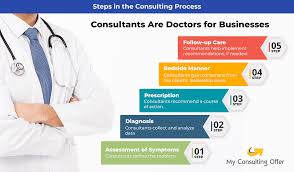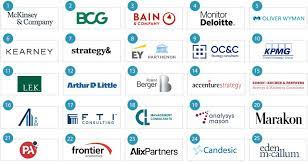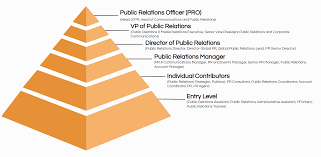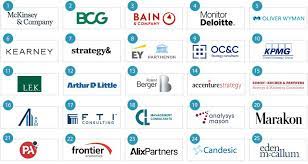Consulting Firms: Unlocking Success through Expertise and Collaboration
In the fast-paced and competitive business landscape of today, organizations often find themselves facing complex challenges that require specialized knowledge and strategic guidance. This is where consulting firms play a crucial role in helping businesses thrive and navigate their way to success.
Consulting firms are professional service providers that offer expertise, insights, and solutions across various industries and sectors. These firms bring together a team of highly skilled professionals who possess in-depth knowledge and experience in specific areas, ranging from strategy development to operational efficiency, marketing, finance, technology, and more.
One of the primary advantages of engaging with a consulting firm is gaining access to external expertise. These firms have a deep understanding of industry best practices, market trends, and emerging technologies. They can provide valuable insights that may not be readily available within an organization’s own resources. By leveraging their expertise, consulting firms help businesses identify opportunities for growth, mitigate risks, and make informed decisions.
Collaboration lies at the heart of successful consulting engagements. When working with a consulting firm, there is a collaborative effort between the consultants and the client’s team. The consultants act as trusted advisors who work closely with the client’s stakeholders to understand their unique challenges and goals. Through this collaboration, they develop tailored strategies and solutions that address specific needs while aligning with the organization’s vision.
Consulting firms also bring objectivity to the table. As external parties with no vested interests or internal biases, they can provide unbiased analysis and recommendations. This objectivity helps organizations gain fresh perspectives on their operations or strategies, enabling them to overcome blind spots or outdated practices that may hinder progress.
Flexibility is another key benefit offered by consulting firms. Businesses can engage these firms on a project basis or for ongoing support depending on their requirements. This flexibility allows organizations to tap into specialized expertise without committing to long-term contracts or hiring full-time staff for temporary needs.
Moreover, consulting firms often have a vast network of industry contacts and resources. This network can be leveraged to connect clients with potential partners, investors, or other professionals who can contribute to the success of their business. By tapping into this extensive network, consulting firms help organizations expand their reach and seize new opportunities.
While consulting firms bring immense value to businesses, it is crucial for organizations to choose the right firm that aligns with their specific needs and values. Factors such as industry experience, track record of success, cultural fit, and communication style should be considered when selecting a consulting partner.
In conclusion, consulting firms serve as trusted advisors who empower businesses to overcome challenges and unlock their full potential. Through their expertise, collaboration, objectivity, flexibility, and network of resources, these firms play a vital role in driving growth and success for organizations across various sectors. By leveraging the services of a reputable consulting firm, businesses can gain a competitive edge in today’s dynamic marketplace and achieve sustainable growth for years to come.
9 Benefits of Engaging Consulting Firms for Your Business
- Access to a wide range of expert knowledge and experience.
- They can provide objective insights and advice.
- They can help identify areas of improvement in your business operations.
- They can provide valuable guidance on how to increase profitability and efficiency in your company.
- They can help you develop strategies for growth and expansion into new markets or products/services lines.
- Consulting firms have access to the latest industry trends, technologies, tools, and data sources that could be beneficial for your business operations or projects.
- Consulting firms are able to provide customised solutions that are tailored specifically for your organisation’s needs and objectives, rather than relying on generic solutions from other companies or organisations that may not be as effective or suitable for your business model or goals.
- They offer cost-effective services as they often charge less than hiring an internal team with the same level of expertise and experience needed for a particular project or task at hand .
- Consulting firms are able to bring together different perspectives from multiple industries which could be beneficial when tackling complex problems within an organisation
Challenges Faced with Consulting Firms: High Costs, Lack of Commitment, and Lack of Experience
- High Costs
- Lack of Commitment
- Lack of Experience
Access to a wide range of expert knowledge and experience.
Access to a Wide Range of Expert Knowledge and Experience: The Power of Consulting Firms
In today’s rapidly evolving business landscape, organizations face a multitude of complex challenges that require specialized knowledge and experience. This is where consulting firms prove to be invaluable partners, offering access to a wide range of expertise that can drive success and growth.
One of the key advantages of engaging with a consulting firm is the ability to tap into their extensive pool of expert knowledge. These firms bring together professionals with diverse backgrounds and skill sets, each possessing deep expertise in specific areas such as strategy, operations, marketing, finance, technology, and more. By leveraging this collective knowledge, consulting firms provide clients with insights and solutions that may not be readily available within their own organization.
The breadth and depth of expertise offered by consulting firms enable businesses to gain fresh perspectives on their operations, strategies, and industry trends. Consultants bring in-depth industry knowledge acquired through years of experience working with various clients across different sectors. This broad exposure equips them with an understanding of best practices, emerging trends, and innovative approaches that can be applied to address specific challenges faced by their clients.
Moreover, consulting firms often have access to proprietary tools, methodologies, and frameworks developed through years of research and practical application. These resources allow consultants to analyze complex problems systematically and provide clients with data-driven insights. By leveraging these tools and methodologies, businesses can make informed decisions based on evidence rather than relying solely on intuition or guesswork.
Consulting firms are also well-versed in identifying patterns and trends within industries. They possess a wealth of benchmarking data that enables them to compare performance metrics against industry standards or competitors’ practices. This benchmarking analysis helps organizations understand where they stand in relation to their peers and identify areas for improvement or opportunities for differentiation.
Furthermore, working with consultants who have diverse experiences across different companies and sectors allows businesses to benefit from cross-pollination of ideas. Consultants can bring in fresh perspectives, innovative approaches, and lessons learned from similar challenges faced by other clients. This exposure to a wide range of experiences fosters creativity and out-of-the-box thinking, which can be instrumental in developing unique solutions that drive competitive advantage.
In conclusion, the access to a wide range of expert knowledge and experience offered by consulting firms is a significant advantage for businesses seeking to overcome challenges and achieve their goals. By leveraging the collective expertise of consultants, organizations can gain fresh insights, data-driven recommendations, industry benchmarks, and innovative approaches. This access to specialized knowledge enables businesses to make informed decisions, drive growth, and stay ahead in today’s dynamic business environment.
They can provide objective insights and advice.
When it comes to making critical business decisions, having access to objective insights and advice is invaluable. This is where consulting firms truly shine. With their external perspective and unbiased approach, consulting firms can provide businesses with the objectivity they need to make informed choices.
One of the key advantages of consulting firms is their ability to offer unbiased analysis and recommendations. Unlike internal employees who may be influenced by personal biases or organizational politics, consultants bring an objective viewpoint to the table. They are not tied to any specific agenda or preconceived notions, allowing them to assess situations with fresh eyes.
By conducting thorough research, data analysis, and market assessments, consulting firms can provide businesses with a clear understanding of their current state and potential opportunities. They help identify areas for improvement, uncover hidden challenges, and offer practical solutions based on facts rather than emotions.
The objectivity provided by consulting firms helps organizations overcome blind spots and biases that may hinder progress. Consultants are not afraid to ask tough questions or challenge existing assumptions. This enables businesses to see beyond their own limitations and consider alternative approaches that they may have overlooked.
Moreover, consulting firms often bring industry-specific expertise and best practices to the table. They have worked with various clients across different sectors, giving them a broad understanding of what works and what doesn’t in specific industries. This knowledge allows them to offer tailored insights that are relevant and applicable to a client’s unique circumstances.
The objective insights provided by consulting firms also foster transparency within organizations. By presenting an unbiased assessment of the current situation, consultants encourage open dialogue among stakeholders. This promotes collaboration, as different perspectives are considered without personal biases clouding judgment.
Ultimately, the objective advice offered by consulting firms empowers businesses to make well-informed decisions that align with their goals. Whether it’s developing a new strategy, implementing organizational changes, or optimizing processes, having access to unbiased expertise can significantly impact the success of these initiatives.
In today’s rapidly changing business landscape, the ability to make objective decisions is crucial for long-term success. Consulting firms play a vital role in providing the objectivity businesses need to navigate challenges and seize opportunities. By leveraging their expertise, organizations can make strategic choices based on reliable insights, leading to improved performance and a competitive edge in the market.
They can help identify areas of improvement in your business operations.
Unlocking Business Potential: How Consulting Firms Identify Areas of Improvement
In the ever-evolving world of business, continuous improvement is essential for staying ahead of the competition and achieving long-term success. This is where consulting firms prove to be invaluable partners, as they possess the expertise to identify areas of improvement within your business operations.
Consulting firms bring a fresh perspective to the table. By conducting thorough assessments and analyses, they can pinpoint inefficiencies, bottlenecks, and areas where processes can be streamlined or optimized. Their objective viewpoint allows them to identify blind spots that may have gone unnoticed within your organization.
One of the key benefits of engaging with a consulting firm is their ability to provide unbiased insights. As external professionals, they are not influenced by internal politics or preconceived notions about how things should be done. This objectivity enables them to objectively evaluate your operations and offer recommendations based on data-driven analysis and industry best practices.
Consulting firms have extensive experience working with businesses across various industries. This exposure equips them with a broad knowledge base and an understanding of what works and what doesn’t in different contexts. Leveraging this expertise, they can identify potential areas for improvement specific to your industry or sector.
Furthermore, consulting firms employ methodologies and frameworks that have been tested and proven effective in similar situations. They bring tried-and-tested tools to assess your operations comprehensively, enabling them to identify gaps or weaknesses that may hinder your business’s performance.
Once areas of improvement are identified, consulting firms work collaboratively with you to develop tailored strategies and action plans. They help you prioritize initiatives based on their potential impact on your business outcomes. By aligning their recommendations with your goals and objectives, they ensure that the proposed improvements are both practical and achievable.
Another advantage is that consulting firms offer a wealth of knowledge about emerging trends, technologies, and industry benchmarks. They stay up-to-date with the latest developments in various sectors, allowing them to provide insights on innovative practices that can be applied to your operations. By leveraging their expertise, you can adopt cutting-edge approaches that give you a competitive edge.
Ultimately, the goal of consulting firms is to help you unlock your business’s full potential. By identifying areas of improvement, they enable you to streamline processes, enhance efficiency, and drive growth. This leads to increased profitability, customer satisfaction, and overall organizational success.
In conclusion, consulting firms play a vital role in helping businesses identify areas of improvement within their operations. Through their objective viewpoint, industry experience, and knowledge of best practices, they offer valuable insights that can lead to transformative changes. By partnering with a reputable consulting firm, you can unlock your business’s true potential and set a solid foundation for future growth.
They can provide valuable guidance on how to increase profitability and efficiency in your company.
Increasing profitability and efficiency are key goals for any business, and consulting firms can be invaluable partners in achieving these objectives. With their expertise and experience, these firms offer valuable guidance on how to optimize operations and maximize financial returns.
Consulting firms have a deep understanding of industry best practices and proven strategies for enhancing profitability. They can analyze the financial health of a company, identify areas of improvement, and develop tailored solutions to drive revenue growth. By conducting thorough assessments of the company’s operations, processes, and financial performance, consultants can pinpoint inefficiencies or bottlenecks that may be hindering profitability.
One of the ways consulting firms help increase profitability is by improving cost management. They can identify unnecessary expenses or areas where costs can be reduced without compromising quality or productivity. This could involve streamlining supply chains, renegotiating vendor contracts, implementing lean practices, or adopting more efficient technologies. By optimizing costs, businesses can achieve higher profit margins and allocate resources more effectively.
Consulting firms also excel in identifying revenue-generating opportunities that may have been overlooked. Through market analysis and customer insights, they can uncover new target markets, develop innovative pricing strategies, or suggest product/service enhancements that align with customer needs. By expanding revenue streams or increasing sales effectiveness, businesses can boost their bottom line significantly.
In addition to increasing profitability, consulting firms focus on enhancing efficiency within an organization. They assess operational processes to identify areas where time is wasted or resources are underutilized. By implementing process improvements such as automation, workflow redesigns, or performance metrics tracking systems, consultants help businesses operate more efficiently and achieve higher productivity levels.
Furthermore, consulting firms provide guidance on organizational structure and talent management to improve efficiency. They assess the skills gap within a company’s workforce and recommend training programs or recruitment strategies to ensure the right people are in the right roles. By optimizing workforce capabilities and ensuring effective team structures are in place, businesses can enhance productivity levels while reducing redundancies or inefficiencies.
Ultimately, consulting firms bring a fresh perspective and external expertise to the table. They can objectively evaluate a company’s operations, financials, and market position to provide valuable insights on how to increase profitability and efficiency. By leveraging their guidance, businesses can make informed decisions, implement effective strategies, and achieve sustainable growth in today’s competitive business environment.
They can help you develop strategies for growth and expansion into new markets or products/services lines.
Unlocking Growth and Expansion: How Consulting Firms Drive Success in New Markets and Product/Service Lines
In an ever-evolving business landscape, growth and expansion are key drivers of success. However, venturing into new markets or introducing new product/service lines can be a daunting task for any organization. This is where consulting firms prove invaluable, offering expertise and guidance to develop effective strategies for growth and expansion.
Consulting firms bring a wealth of knowledge and experience to the table when it comes to entering new markets or diversifying product/service offerings. These firms have a deep understanding of market dynamics, consumer trends, competitive landscapes, and regulatory environments. Leveraging this expertise, they help businesses identify untapped opportunities and develop comprehensive strategies tailored to their unique needs.
When it comes to entering new markets, consulting firms conduct thorough market research to gain insights into customer preferences, purchasing behaviors, cultural nuances, and local regulations. Armed with this information, they assist organizations in formulating market entry strategies that minimize risks while maximizing potential returns. From identifying target segments to establishing distribution channels and pricing structures, consulting firms provide a roadmap for success in unfamiliar territories.
Similarly, when exploring new product or service lines, consulting firms play a vital role in assessing market demand and competition. They conduct feasibility studies to evaluate the viability of potential offerings based on factors such as market size, customer needs, competitive advantages, production capabilities, and profitability projections. Through this analysis, consulting firms help businesses make informed decisions regarding product development or service expansion.
Moreover, consulting firms assist organizations in developing robust growth strategies that align with their overall business objectives. These strategies encompass various aspects such as marketing plans, sales strategies, operational considerations, resource allocation plans, risk management frameworks, and financial projections. By taking a holistic approach to growth planning under the guidance of consulting experts who specialize in strategy development, businesses can minimize uncertainties while maximizing their chances of success.
One significant advantage of engaging with consulting firms for growth and expansion is the objectivity they bring to the table. As external advisors, they offer unbiased perspectives and challenge conventional thinking within organizations. This objectivity helps businesses identify blind spots, overcome internal biases, and embrace innovative approaches that can drive growth and expansion.
Furthermore, consulting firms often have a vast network of industry contacts and connections. Leveraging these networks, they can assist businesses in establishing strategic partnerships, sourcing suppliers or distributors, accessing funding opportunities, or even identifying potential acquisition targets. This network provides businesses with valuable resources to support their growth strategies and expedite their entry into new markets or product/service lines.
In conclusion, consulting firms are invaluable partners when it comes to developing strategies for growth and expansion into new markets or product/service lines. Their expertise in market research, strategy development, objectivity, and extensive networks empowers organizations to make informed decisions that drive success in unfamiliar territories. By leveraging the services of a reputable consulting firm, businesses can navigate the complexities of growth with confidence and unlock new opportunities for long-term success.
Staying up-to-date with the latest industry trends, technologies, tools, and data sources is essential for businesses to remain competitive in today’s rapidly evolving landscape. However, it can be challenging for organizations to keep pace with these advancements while focusing on their core operations. This is where consulting firms shine.
One significant advantage of engaging with a consulting firm is their access to the latest industry insights and resources. These firms invest heavily in staying at the forefront of emerging trends and technologies within their respective fields. They have dedicated teams that continuously research, analyze, and monitor industry developments.
By partnering with a consulting firm, businesses gain access to this wealth of knowledge and expertise. Consultants bring fresh perspectives and innovative ideas that can revolutionize business operations or projects. They possess in-depth knowledge about cutting-edge tools, methodologies, and data sources that can drive efficiency, improve decision-making processes, and enhance overall performance.
Consulting firms are well-versed in leveraging technology to solve complex business challenges. They understand how emerging technologies such as artificial intelligence (AI), machine learning (ML), big data analytics, cloud computing, and automation can be applied to various industries. By harnessing these technologies effectively, businesses can streamline processes, optimize workflows, and unlock new opportunities.
Moreover, consulting firms have extensive networks and partnerships with industry leaders and solution providers. This enables them to tap into a wide range of resources that may not be readily available to individual organizations. Whether it’s access to proprietary databases or connections with niche experts or vendors, consulting firms can provide valuable insights and recommendations based on the most up-to-date information.
Having access to the latest industry trends also allows consulting firms to provide forward-thinking strategies tailored specifically for each client’s unique needs. By incorporating these trends into their recommendations, consultants help organizations stay ahead of the curve and adapt proactively to market shifts.
In summary, partnering with a consulting firm grants businesses access to invaluable industry trends, technologies, tools, and data sources. This access empowers organizations to make informed decisions, optimize operations, and seize new opportunities. By leveraging the expertise and resources of consulting firms, businesses can stay competitive in an ever-evolving business landscape and position themselves for long-term success.
Consulting firms are able to provide customised solutions that are tailored specifically for your organisation’s needs and objectives, rather than relying on generic solutions from other companies or organisations that may not be as effective or suitable for your business model or goals.
Unlocking Success with Customised Solutions: The Power of Consulting Firms
In the realm of business, one size does not fit all. Each organization has its unique set of challenges, goals, and aspirations. This is where consulting firms truly shine, offering a distinct advantage by providing customised solutions tailored specifically to meet the needs and objectives of your organization.
Unlike off-the-shelf or generic solutions offered by other companies or organizations, consulting firms take the time to understand your business model, culture, and strategic objectives. They delve deep into your organization’s intricacies to gain a comprehensive understanding of your challenges and goals. Armed with this knowledge, they craft bespoke strategies that align perfectly with your unique requirements.
By offering customised solutions, consulting firms ensure that every recommendation and action plan is designed specifically for your organization’s success. They consider factors such as industry dynamics, market trends, competitive landscape, and internal capabilities to develop strategies that are not only effective but also suitable for your business model.
These tailored solutions provide a competitive edge by addressing your organization’s specific pain points. Generic solutions may offer temporary relief but often fail to address the root causes or provide sustainable long-term results. Consulting firms go beyond quick fixes; they dig deep to identify underlying issues and design comprehensive solutions that drive lasting change.
Furthermore, customised solutions from consulting firms enable organizations to maximize their resources effectively. By focusing on what matters most to your business objectives, these tailored strategies optimize resource allocation and minimize wastage. This targeted approach ensures that every effort is directed towards achieving tangible results aligned with your goals.
Another significant advantage of customised solutions is their adaptability. Businesses operate in dynamic environments where market conditions can change rapidly. Consulting firms understand this reality and design flexible strategies that can be adjusted as needed to accommodate evolving circumstances. Customisation allows for agility in decision-making and ensures that organizations can navigate uncertainties effectively.
Moreover, customized solutions foster a sense of ownership within the organization. When employees see that strategies and solutions are specifically tailored to their unique challenges, they feel a greater sense of involvement and commitment. This boosts morale, enhances teamwork, and drives overall performance.
In conclusion, the ability of consulting firms to provide customised solutions is a game-changer for organizations seeking success in today’s competitive landscape. By tailoring strategies specifically to your organization’s needs and objectives, consulting firms offer a powerful advantage over generic solutions. These bespoke approaches address your unique challenges, optimize resource allocation, foster adaptability, and promote a sense of ownership within the organization. With customised solutions from reputable consulting firms, your organization can confidently navigate towards success while staying true to its vision and goals.
They offer cost-effective services as they often charge less than hiring an internal team with the same level of expertise and experience needed for a particular project or task at hand .
Consulting Firms: Cost-Effective Solutions for Business Success
In today’s competitive business landscape, organizations are constantly seeking ways to optimize their resources and maximize their return on investment. When it comes to specialized projects or tasks requiring expertise, consulting firms offer a cost-effective solution that can save businesses both time and money.
One significant advantage of engaging a consulting firm is the cost-effectiveness they bring to the table. These firms often charge less than hiring an internal team with the same level of expertise and experience needed for a particular project or task at hand. By leveraging the services of a consulting firm, businesses can access top-tier professionals without incurring the overhead costs associated with recruitment, training, salaries, benefits, and infrastructure.
Consulting firms operate on a project basis or provide specific services tailored to meet the unique needs of each client. This flexibility allows organizations to engage consultants only when required, avoiding long-term commitments or unnecessary expenses. Whether it’s strategy development, process improvement, market research, or technology implementation, consulting firms offer specialized services that deliver tangible results while keeping costs under control.
Moreover, by engaging a consulting firm, businesses gain access to a diverse pool of experts who bring industry-specific knowledge and best practices. These professionals have honed their skills through years of experience working with various clients across different sectors. Their expertise allows them to quickly identify areas for improvement and implement effective solutions efficiently. This saves businesses valuable time that would otherwise be spent on trial-and-error approaches or extensive research.
Another cost-saving aspect of working with consulting firms is the ability to avoid potential pitfalls and costly mistakes. Consultants bring an objective perspective to the table and can identify areas where resources may be wasted or misallocated. They can help organizations streamline processes, eliminate redundancies, and optimize workflows for maximum efficiency. By avoiding unnecessary expenses and optimizing resource allocation, businesses can achieve significant cost savings in both the short and long term.
Furthermore, consulting firms often stay up-to-date with the latest industry trends, technologies, and best practices. This knowledge allows them to implement innovative solutions that drive business growth and keep organizations ahead of the competition. By leveraging their expertise, businesses can benefit from cutting-edge strategies and tactics without having to invest in extensive research or training for an internal team.
In conclusion, consulting firms offer cost-effective services that enable businesses to access specialized expertise without incurring the expenses associated with hiring and maintaining an internal team. By charging less than the cost of assembling a similarly skilled internal team, consulting firms provide a cost-efficient solution for organizations seeking professional guidance on specific projects or tasks. With their industry-specific knowledge, efficiency, and ability to avoid costly mistakes, consulting firms play a vital role in helping businesses achieve success while optimizing their resources.
Consulting firms are able to bring together different perspectives from multiple industries which could be beneficial when tackling complex problems within an organisation
Consulting Firms: Harnessing the Power of Diverse Perspectives for Organizational Success
In today’s complex and rapidly changing business environment, organizations often face challenges that require innovative and multidimensional solutions. This is where consulting firms excel, leveraging their ability to bring together diverse perspectives from multiple industries to tackle complex problems within organizations.
One significant advantage of consulting firms is their unique position as observers and participants in various industries. They work with clients across different sectors, allowing them to gain valuable insights into a wide range of business models, strategies, and best practices. This exposure enables consulting firms to bring fresh perspectives and cross-industry knowledge to the table when solving complex problems.
By drawing on experiences from various industries, consulting firms can identify patterns, trends, and successful strategies that may not be immediately apparent within a single organization. This broad perspective allows consultants to offer creative solutions that have been proven effective in other contexts. It also helps break down silos within an organization by introducing new ideas and approaches that may challenge traditional thinking.
Moreover, consulting firms have access to a vast network of professionals with diverse backgrounds and expertise. These networks enable them to tap into a wide range of skills and knowledge when addressing complex problems. By bringing together individuals from different industries and disciplines, consulting firms can foster collaboration and create innovative solutions that incorporate the best practices from multiple fields.
The ability of consulting firms to bridge gaps between industries is particularly valuable when tackling complex problems that require a holistic approach. For example, an organization facing operational challenges could benefit from insights gained in supply chain management from the manufacturing industry or customer experience strategies from the retail sector. Consulting firms can connect these dots by synthesizing knowledge from multiple sources and tailoring it to fit the specific needs of their clients.
Furthermore, by combining diverse perspectives, consulting firms encourage out-of-the-box thinking within organizations. They challenge conventional wisdom and encourage clients to consider alternative solutions that they may not have considered otherwise. This fresh and innovative approach can lead to breakthroughs and transformative change within organizations.
In conclusion, consulting firms bring a unique advantage to organizations by harnessing the power of diverse perspectives from multiple industries. By drawing on cross-industry knowledge, networks, and experiences, these firms offer fresh insights and innovative solutions to tackle complex problems. The ability to think beyond traditional boundaries and incorporate best practices from various sectors can be a game-changer for organizations striving for success in today’s dynamic business landscape. Consulting firms truly embody the saying that “two heads are better than one,” as they bring together the collective wisdom of multiple industries to drive organizational growth and overcome challenges.
High Costs
High Costs: A Consideration When Engaging Consulting Firms
While consulting firms offer a range of benefits to businesses, it is important to acknowledge that one potential drawback is the associated high costs. The expertise and specialized services provided by consulting firms often come with a premium price tag, making it challenging for some organizations, especially smaller ones or those with limited budgets, to afford their services.
The cost of engaging a consulting firm can vary depending on factors such as the firm’s reputation, expertise, scope of work, duration of engagement, and the complexity of the project. These costs typically include consultant fees, project management expenses, and any additional resources required for the assignment.
For organizations operating on tight budgets or facing financial constraints, the high costs associated with consulting firms may pose a significant barrier. It is essential for businesses to carefully evaluate their financial capabilities and weigh the potential return on investment before committing to engage a consulting firm.
However, it is crucial to consider the long-term benefits that can outweigh the immediate financial burden. Consulting firms bring valuable expertise and insights that can help organizations overcome challenges, improve efficiency, enhance strategies, and drive growth. By leveraging their knowledge and experience, businesses may achieve significant cost savings or revenue increases in the long run.
To mitigate the impact of high costs when engaging consulting firms, organizations can explore alternative options. For instance, they can consider engaging smaller boutique consulting firms that may offer more competitive pricing while still delivering quality services. Additionally, businesses can negotiate project fees or explore flexible payment arrangements with consulting firms to better align with their budgetary constraints.
Another approach is to carefully prioritize and select specific areas where external expertise is truly necessary. By focusing on critical projects or areas that have a direct impact on business goals and outcomes, organizations can allocate their resources more effectively while still benefiting from consulting support.
Lastly, it is essential for businesses to conduct thorough due diligence when selecting a consulting firm. Evaluating different options based on their expertise, track record, and client testimonials can help ensure that the chosen firm delivers value for the investment made.
While the high costs associated with consulting firms may pose a challenge for some organizations, it is important to consider the potential long-term benefits and weigh them against the immediate financial burden. By carefully evaluating their needs, exploring alternative options, and selecting the right consulting partner, businesses can make informed decisions that align with their budgetary constraints while still reaping the rewards of professional expertise.
Lack of Commitment
Lack of Commitment: An Unfortunate Con of Consulting Firms
While consulting firms offer numerous benefits to businesses, it is important to acknowledge that, like any industry, there can be drawbacks. One such con is the potential lack of commitment from some consultants when it comes to long-term projects or taking ownership of their work.
In a fast-paced business environment, organizations often require sustained support and dedication from their consulting partners. However, there may be instances where consultants fail to fully invest themselves in the project or demonstrate a lack of ownership. This can lead to subpar results and leave clients feeling dissatisfied.
One reason for this lack of commitment could be the nature of consulting engagements themselves. Consultants often work on multiple projects simultaneously, balancing various client demands and deadlines. As a result, they may struggle to allocate sufficient time and attention to each individual project, compromising their ability to truly commit.
Additionally, some consultants may view their role as purely advisory rather than taking responsibility for the implementation and outcomes of their recommendations. This can create a divide between the consultant’s expertise and the client’s internal team, hindering effective collaboration and hindering progress.
To mitigate this con, it is crucial for businesses seeking consulting services to carefully select firms that prioritize commitment and accountability. Thoroughly researching a firm’s track record and reputation can provide insights into their level of dedication and willingness to take ownership. Seeking recommendations from trusted sources or requesting case studies that demonstrate successful long-term partnerships can also help in making an informed decision.
Furthermore, establishing clear expectations and deliverables at the onset of the engagement is essential. Clients should communicate their desired level of involvement from consultants throughout the project lifecycle, ensuring that both parties are aligned on commitments and responsibilities.
In conclusion, while lack of commitment from some consultants may pose challenges in consulting engagements, it is not representative of all firms or professionals within the industry. By conducting due diligence during the selection process and fostering open communication, businesses can mitigate this con and find consultants who are committed to delivering exceptional results and taking ownership of their work.
Lack of Experience
Lack of Experience: A Potential Con of Consulting Firms
While consulting firms offer a range of benefits, it is important to acknowledge that there can be potential drawbacks as well. One such concern is the lack of experience that some consultants may possess, which can raise questions about the quality of advice they provide compared to an in-house team.
Consulting firms often employ professionals with diverse backgrounds and areas of expertise. While this diversity can bring fresh perspectives and innovative ideas to the table, it also means that not all consultants may have extensive experience in every aspect of a client’s business.
In contrast, an in-house team typically has a deep understanding of the organization’s operations, industry dynamics, and specific challenges. They have firsthand knowledge gained through years of working within the company and are intimately familiar with its culture, processes, and goals. This level of experience can be invaluable when it comes to providing tailored advice that aligns precisely with the organization’s needs.
However, it is essential to note that consulting firms mitigate this potential con by carefully selecting their consultants based on their qualifications and expertise. Reputable consulting firms prioritize hiring professionals who possess industry-specific knowledge and relevant experience. They ensure that their consultants undergo rigorous training programs to enhance their skills and stay up-to-date with the latest trends.
Furthermore, consulting firms often engage in extensive research and analysis before providing recommendations to clients. They invest time in understanding the client’s business context, conducting market research, and benchmarking against industry standards. This thorough approach helps compensate for any potential gaps in individual consultant experience by ensuring a comprehensive understanding of the client’s situation.
Another way consulting firms address this concern is through collaboration. Consultants work closely with the client’s internal team members who possess deep operational knowledge. By combining their external expertise with internal insights, they create a holistic approach that leverages both perspectives.
To mitigate any doubts about consultant experience or expertise, organizations should thoroughly evaluate potential consulting partners before engaging their services. This includes assessing the firm’s track record, client testimonials, and the qualifications of the consultants who will be working on the project.
In conclusion, while it is true that consultants may not have the same level of experience or expertise as an in-house team, reputable consulting firms take steps to address this potential con. Through careful selection, ongoing training, collaboration with internal teams, and thorough research, consulting firms strive to provide high-quality advice that aligns with their clients’ needs. By considering these factors and selecting a trusted consulting partner, organizations can mitigate any concerns about experience gaps and leverage the unique value that consulting firms bring.











